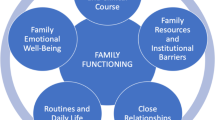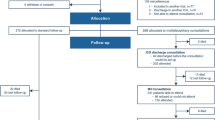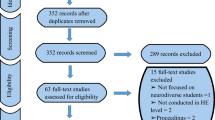Abstract
People with Intellectual Disability (ID) were more likely to contract COVID-19 infection and more likely to die from the consequences. However, there is no evidence on the long-term impact of COVID-19 infection in people with ID. Post-Covid Syndrome (PCS) is an established diagnosis that requires specialist clinical support. To date there is no data on how common PCS is in people with ID, or how symptoms present. Dysphagia is identified as a clinical marker because of the known association with PCS, and the clear objective diagnostic criteria applicable through specialist assessment. This investigation presents a cohort of people with ID, who developed dysphagia/worsening of dysphagia post diagnosis with COVID-19. Cases were identified through support from the Royal College of Speech and Language Therapists. Data was collected by electronic survey, including application of the COVID-19 Yorkshire Rehabilitation Scale-modified (C19-YRSm). The C19-YRSm is a validated assessment tool for PCS and it’s impact upon functional disability. This case series identifies that symptoms consistent with PCS are present in people with ID, post-COVID-19 infection. The risk of diagnostic overshadowing or misdiagnosis is high due to the subjective nature and the quality of PCS symptoms. People with ID who develop PCS may not be readily identified by clinical services and therefore not be accessing the specialist medical support required. Furthermore, changes in behaviour secondary to PCS may lead to unnecessary increased prescribing of psychotropic medication which in itself risks worsening dysphagia. Dysphagia could be an important bellwether to identify PCS in people with ID.
Similar content being viewed by others

Data Availability
The data that support the findings of this study are available from the corresponding author upon reasonable request.
References
American Psychiatric Association. Diagnostic and statistical manual of mental disorders: DSM-5. 5th ed. Washington, DC.: American Psychiatric Publishing; 2013.
Perera B, Laugharne R, Henley W, Zabel A, Lamb K, Branford D, Courtanay K, Alexander R, Purandare K, Wijeratne A, Radhakrishnan V. COVID-19 deaths in people with intellectual disability in the UK and Ireland: descriptive study. BJPsych Open. 2020;6(6): e123.
Williamson EJ, Walker AJ, Bhaskaran K, Bacon S, Bates C, Morton CE, Curtis HJ, Mehrkar A, Evans D, Inglesby P, Cockburn J. Factors associated with COVID-19-related death using OpenSAFELY. Nature. 2020;584(7821):430–6.
Lee CL, Huang G, Banda KJ, Chu YH, Jen HJ, Chu H, Liu D, Pien LC, Chen R, Chou KR. Prevalence of oropharyngeal dysphagia and risk of mortality among hospitalized COVID-19 patients: a meta-analysis. J Global Health. 2022;12
Grilli GM, Giancaspro R, Del Colle A, Quarato CMI, Lacedonia D, Foschino Barbaro MP, Cassano M. Dysphagia in non-intubated patients affected by COVID-19 infection. Eur Arch Otorhinolaryngol. 2022;279(1):507–13.
Robertson J, Chadwick D, Baines S, Emerson E, Hatton C. Prevalence of dysphagia in people with intellectual disability: a systematic review. Intellect Dev Disabil. 2017;55(6):377–91.
Chadwick DD, Jolliffe J. A descriptive investigation of dysphagia in adults with intellectual disabilities. J Intellect Disabil Res. 2009;53(1):29–43.
Ball SL, Panter SG, Redley M, Proctor CA, Byrne K, Clare ICH, Holland AJ. The extent and nature of need for mealtime support among adults with intellectual disabilities. J Intellect Disabil Res. 2012;56(4):382–401.
Mallart R, Rossignol C, Poppe JB, Prum G, Tamion F, Veber B, Verin E. Prevalence and evaluation of oropharyngeal dysphagia in patients with severe acute respiratory syndrome coronavirus 2 infection in the intensive care unit. J Laryngol Otol. 2022;136(7):649–53.
Excellence NIFC. Covid‐19 rapid guideline: managing the long‐term effects of covid‐19. 2021.
Alkodaymi MS, Omrani OA, Fawzy NA, Abou Shaar B, Almamlouk R, Riaz M, Obeidat M, Obeidat Y, Gerberi D, Taha RM, Kashour Z. Prevalence of post-acute COVID-19 syndrome symptoms at different follow-up periods: a systematic review and meta-analysis. Clin Microbiol Infect. 2022;28:657–66.
Rawlings GH, Beail N. Long-COVID in people with intellectual disabilities: a call for research of a neglected area. Br J Learn Disabil. 2023;51(1):91–8.
Shankar R, Perera B, Roy A, Courtenay K, Laugharne R, Sivan M. Post-COVID syndrome and adults with intellectual disability: another vulnerable population forgotten? Br J Psychiatry. 2023;222(1):1–3.
Fernández-de-Las-Peñas C, Palacios-Ceña D, Gómez-Mayordomo V, Cuadrado ML, Florencio LL. Defining post-COVID symptoms (post-acute COVID, long COVID, persistent post-COVID): an integrative classification. Int J Environ Res Public Health. 2021;18(5):2621.
Sivan M, Preston N, Parkin A, Makower S, Gee J, Ross D, Tarrant R, Davison J, Halpin S, O’Connor RJ, Horton M. The modified COVID-19 Yorkshire Rehabilitation Scale (C19-YRSm) patient-reported outcome measure for Long Covid or Post-COVID-19 syndrome. J Med Virol. 2022;94(9):4253–64.
Badenoch JB, Rengasamy ER, Watson C, Jansen K, Chakraborty S, Sundaram RD, Hafeez D, Burchill E, Saini A, Thomas L, Cross B, Hunt CK, Conti I, Ralovska S, Hussain Z, Butler M, Pollak TA, Koychev I, Michael BD, Holling H, et al. Persistent neuropsychiatric symptoms after COVID-19: a systematic review and meta-analysis. Brain Commun. 2021;4(1):fcab297. https://doi.org/10.1093/braincomms/fcab297.
Sivan M, Parkin A, Makower S, Greenwood DC. Post-COVID syndrome symptoms, functional disability, and clinical severity phenotypes in hospitalized and nonhospitalized individuals: a cross-sectional evaluation from a community COVID rehabilitation service. J Med Virol. 2022;94(4):1419–27.
Miarons Font M, Rofes Salsench L. Antipsychotic medication and oropharyngeal dysphagia: systematic review. Eur J Gastroenterol Hepatol. 2017;29(12):1332–9.
Naqvi D, Perera B, Mitchell S, Sheehan R, Shankar R. COVID-19 pandemic impact on psychotropic prescribing for adults with intellectual disability: an observational study in English specialist community services. BJPsych Open. 2022;8(1): e7.
Tromans S, Kinney M, Chester V, Alexander R, Roy A, Sander JW, Dudson H, Shankar R. Priority concerns for people with intellectual and developmental disabilities during the COVID-19 pandemic. BJPsych open. 2020;6(6): e128. https://doi.org/10.1192/bjo.2020.122.
Howkins J, Hassiotis A, Bradley E, Levitas A, Sappok T, Sinai A, Thakur A, Shankar R. International clinician perspectives on pandemic-associated stress in supporting people with intellectual and developmental disabilities. BJPsych Open. 2022;8(3): e84. https://doi.org/10.1192/bjo.2022.49.
Acknowledgements
None
Funding
None.
Author information
Authors and Affiliations
Contributions
All authors satisfy the ICMJE guidance by substantially contributing to the design, analysis and interpretation of the work, drafting of the manuscript, final approval of the manuscript and all agree to be accountable for all aspects of the work in ensuring that questions related to the accuracy or integrity of any part of the work is appropriately investigated and resolved.
Corresponding author
Ethics declarations
Conflict of interests
No author has any direct disclosure/conflict of interests related to the submitted work. RL has been chief investigator in studies for Janssen and Boehringer-Ingelheim Ltd. RS has received institutional and research support from LivaNova, UCB, Eisai, Veriton Pharma, Bial, Angelini, UnEEG and Jazz/GW pharma outside the submitted work. He holds grants from NIHR AI, SBRI and other funding bodies all outside this work. No other author has declared any conflict of interest.
Additional information
Publisher's Note
Springer Nature remains neutral with regard to jurisdictional claims in published maps and institutional affiliations.
Supplementary Information
Below is the link to the electronic supplementary material.
Rights and permissions
Springer Nature or its licensor (e.g. a society or other partner) holds exclusive rights to this article under a publishing agreement with the author(s) or other rightsholder(s); author self-archiving of the accepted manuscript version of this article is solely governed by the terms of such publishing agreement and applicable law.
About this article
Cite this article
Watkins, L., Kulkarni, A., Webber, E. et al. People with Intellectual Disabilities, Dysphagia and Post-Covid Syndrome. Dysphagia (2024). https://doi.org/10.1007/s00455-024-10679-1
Received:
Accepted:
Published:
DOI: https://doi.org/10.1007/s00455-024-10679-1



